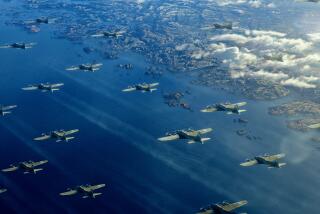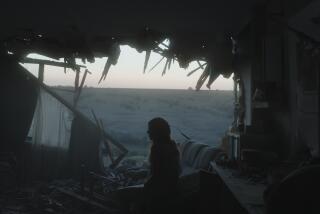The Controversy Over ‘Flight 103’ : Television: Pan Am executives claim Sunday’s HBO docudrama contains ‘outright fabrications.’
- Share via
Executives at Pan American World Airways have taken an advance look at a new HBO docudrama, “The Tragedy of Flight 103: The Inside Story,” and angrily reject the depiction of the company as indifferent to security problems that might have led to the 1988 terrorist bombing of one of its jetliners over Lockerbie, Scotland.
The movie, said one Pan Am official, contains “reckless disregard for the facts” and “outright fabrications” and is “a work of fiction” and “a cheap shot.”
The 90-minute film, to be shown Sunday at 9 on the pay-cable network, covers 2 1/2 years leading up to the explosion of Pan Am Flight 103 at 31,000 feet over Lockerbie on Dec. 21, 1988. Believed to be the work of Palestinian terrorists, the bomb blast killed 259 people in the plane and 11 people on the ground.
As a drama that purports to be factual, “Tragedy of Flight 103” is probably one of the harshest indictments of a major American corporation ever shown on American television. Several airline executives are depicted as arrogant and almost cynically indifferent to security problems in face of declining company profits. They also are portrayed as making false advertising claims and using various forms of subterfuge to fool the public and federal authorities on the state of Pan Am’s security operations.
The movie is a joint venture of HBO and Granada Television in England, which used its investigative unit from its heralded “World in Action” series to produce the film. (The movie was first presented Nov. 26 in England on Granada; tapes of that broadcast are understood to have been sent to Pan Am headquarters in New York.)
The producers said they interviewed dozens of people involved in the key events of the tragedy as well as sources in Iran and the Mossad, the Israeli secret service. They claim that their investigation reveals previously undisclosed material, especially the methods in which Pan Am handled the panicky issue of airline terrorism.
Major Pan Am executives portrayed in the movie are chairman C. Edward Acker (played by Ned Beatty), chief operating officer Martin Shugrue (Harry Ditson) and security chief Harry Pizer (Vincent Gardenia). All left the company before the disaster. Acker is retired in Bermuda; Shugrue is bankruptcy trustee of Eastern Airlines. None could be reached for comment.
But Jefferey Kriendler, Pan Am vice president for corporate communications, who acts as the company spokesman, said that he talked with the three men and that they insisted “that all of the claims made about what they’re stating (in the film) are false.”
Acknowledging that the movie is “clearly very damning,” Kriendler said, “We are very upset, angry that they used falsehoods and misrepresented the facts. . . . We have withstood this terrible publicity (of the disaster) and we have become stronger and we have managed through it and this will not drag us down.”
Kriendler said that Pan Am offered to consult with the producers in their research but were refused. But Granada researcher Alasdair Palmer said that he spent nearly two hours with Kriendler and a Pan Am attorney in New York.
Kriendler said that at least one Granada source was paid $6,000 for “his cooperation”; “absolute nonsense!” countered Leslie Woodhead, the film’s producer-director.
Further, some of the purported “key” sources amounted to “former employees . . . and the circumstances of their employment and dismissals render their version, in our opinion, as bias, antagonistic to Pan Am and unreliable,” Kriendler said.
He made references to Fred Ford (played by Peter Boyle), who was hired to oversee the airline’s highly publicized Alert security system that was instigated in 1986 as a way to combat a surge of passenger fears over terrorism, and retired British Army Lt. Col. Wilfred (Jumbo) Wood (played by Timothy West), a counterterrorism expert employed as a consultant.
Last Wednesday, Wood testified about alleged Pan Am security foul-ups during the 10th week of the Lord Advocate inquiry on the Lockerbie crash at Dumfries, Scotland. He described how Pan Am officials fought among themselves like “robber barons in their fiefdoms” trying to hold onto their powers.
Researcher Palmer said that the disaster could have happened to any airline. “What was different about Pan Am,” he said, “is the advertising campaign, which in 1986 was to sell security to the public--and, in fact, what they were selling was not security but risk.
“I mean, that is the real difference between Pan Am and, say, American Airlines, whose executives I interviewed. They also instituted a $5 surcharge (on all overseas passengers, to help pay for added anti-terrorist security) but they didn’t go out and shout from the rooftops, ‘We’ve got a new secure airline and if you fly us, you’ll be safe’--and then not do anything about it.”
In May, the Presidential Commission on Airline Security and Terrorism issued a report in which it concluded that the Lockerbie disaster “may well have been preventable.” Pan Am repeatedly came in for blistering criticism for security inadequacies.
The film interweaves several plot lines: Pan Am security programs; the plotting by terrorists whose passions were rekindled by the destruction of the Iranian Airbus by the U.S. cruiser Vincennes in July, 1988; the sending of bomb ingredients into Germany from various parts of the Arab world; alleged subterfuges by the Pan Am security staff at the Frankfurt Airport to hide supposed inadequacies from the U.S. federal investigators; the West German police’s “Autumn Leaves” operation to “sweep up” gangs of radical Palestinian terrorists; the curious release the next morning of several men, including the alleged bomb maker, and the dispatch of the deadly suitcase in Malta, from where it then would be shipped through Frankfurt, then onto Flight 103.
Colin Callender, executive producer of the “HBO Showcase” series under which the film is being presented, said that the Granada team “came to this story as journalists, so the decision as to how to structure a scene, the overall shape of the film, was driven by journalistic considerations rather than dramatic consideration.”
Producer-director Woodhead said that no sooner than writer Michael Eaton finished one draft of the script than it was out of date, because of new information from the researchers. Eaton did 10 drafts.
Ray Fitzwalter, executive producer for Granada, said that the movie was scrutinized by lawyers on both sides of the Atlantic, on the watch for potential legal dangers, with HBO’s attorneys in New York being especially “ridiculous.” He cited a scene in which a terrorist is reading a German supermarket newspaper: “We were asked if we had copyright clearance and was there any possibility of this model in the photo in the paper suing us.”
“Tragedy of Flight 103” was sold to German TV for airing Dec. 18, and “It has to be lawyered over there too,” said Fitzwalter. “They’re slightly potty. If they have a drama documentary, they have to change the names so that no real names are included, believe it or not.
“They were considering cutting all visual references to Pan Am--in case it was thought that as a public-service broadcaster, they might be giving them free advertising!”
More to Read
The biggest entertainment stories
Get our big stories about Hollywood, film, television, music, arts, culture and more right in your inbox as soon as they publish.
You may occasionally receive promotional content from the Los Angeles Times.










